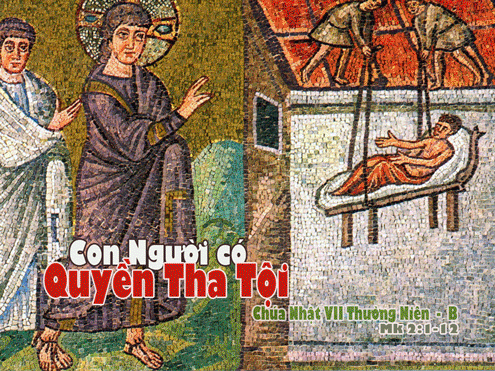Thánh Kinh bằng hình Chúa Nhật 7 Thường Niên B
Thánh Kinh bằng hình Chúa Nhật 7 Thường Niên B

Mc 2, 1-12

Sau ít ngày, Chúa Giêsu lại trở về Capharnaum. Nghe tin Người đang ở trong nhà, nhiều người tuôn tới đông đảo, đến nỗi ngoài cửa cũng không còn chỗ đứng, và Người giảng dạy họ. Người ta mang đến cho Người một kẻ bất toại do bốn người khiêng.
When Jesus returned to Capernaum after some days, it became known that he was at home. Many gathered together so that there was no longer room for them, not even around the door, and he preached the word to them. They came bringing to him a paralytic carried by four men.
Als er einige Tage später nach Kafarnaum zurückkam, wurde bekannt, dass er (wieder) zu Hause war. 2 Und es versammelten sich so viele Menschen, dass nicht einmal mehr vor der Tür Platz war; und er verkündete ihnen das Wort. 3 Da brachte man einen Gelähmten zu ihm; er wurde von vier Männern getragen.

Vì dân chúng quá đông, không thể khiêng đến gần Người được, nên họ dỡ mái nhà trên chỗ Người ngồi một lỗ to, rồi thòng chiếc chõng với người bất toại xuống. Thấy lòng tin của họ, Chúa Giêsu nói với người bất toại rằng: “Hỡi con, tội lỗi con được tha”.
Unable to get near Jesus because of the crowd, they opened up the roof above him. After they had broken through, they let down the mat on which the paralytic was lying. When Jesus saw their faith, he said to the paralytic, “Child, your sins are forgiven.”
Weil sie ihn aber wegen der vielen Leute nicht bis zu Jesus bringen konnten, deckten sie dort, wo Jesus war, das Dach ab, schlugen (die Decke) durch und ließen den Gelähmten auf seiner Tragbahre durch die Öffnung hinab. Als Jesus ihren Glauben sah, sagte er zu dem Gelähmten: Mein Sohn, deine Sünden sind dir vergeben!

Lúc ấy, có một ít luật sĩ ngồi đó, họ thầm nghĩ rằng: “Sao ông này lại nói thế? Ông nói phạm thượng. Ai có quyền tha tội, nếu không phải là một mình Thiên Chúa”. Chúa Giêsu biết tâm trí họ nghĩ như vậy, liền nói với họ: “Tại sao lòng các ông nghĩ như thế? Nói với người bất toại này: ‘Tội lỗi con được tha’ hay nói: ‘Hãy chỗi dậy vác chõng mà đi’, đằng nào dễ hơn? Nhưng (nói thế là) để các ông biết Con Người có quyền tha tội dưới đất”.
Now some of the scribes were sitting there asking themselves,”Why does this man speak that way? He is blaspheming.Who but God alone can forgive sins?” Jesus immediately knew in his mind what they were thinking to themselves, so he said, “Why are you thinking such things in your hearts? Which is easier, to say to the paralytic, ‘Your sins are forgiven,’ or to say, ‘Rise, pick up your mat and walk?’ But that you may know that the Son of Man has authority to forgive sins on earth”
Einige Schriftgelehrte aber, die dort saßen, dachten im Stillen: Wie kann dieser Mensch so reden? Er lästert Gott. Wer kann Sünden vergeben außer dem einen Gott? Jesus erkannte sofort, was sie dachten, und sagte zu ihnen: Was für Gedanken habt ihr im Herzen? Ist es leichter, zu dem Gelähmten zu sagen: Deine Sünden sind dir vergeben!, oder zu sagen: Steh auf, nimm deine Tragbahre und geh umher? Ihr sollt aber erkennen, dass der Menschensohn die Vollmacht hat, hier auf der Erde Sünden zu vergeben.

Người nói với kẻ bất toại: “Ta truyền cho con hãy chỗi dậy, vác chõng mà về nhà”. Lập tức người ấy đứng dậy, vác chõng ra đi trước mặt mọi người, khiến ai nấy sửng sốt và ngợi khen Thiên Chúa rằng: “Chúng tôi chưa từng thấy như thế bao giờ”.
He said to the paralytic, “I say to you, rise, pick up your mat, and go home.” He rose, picked up his mat at once, and went away in the sight of everyone. They were all astounded and glorified God, saying, “We have never seen anything like this.”
Und er sagte zu dem Gelähmten: Ich sage dir: Steh auf, nimm deine Tragbahre, und geh nach Hause! Der Mann stand sofort auf, nahm seine Tragbahre und ging vor aller Augen weg. Da gerieten alle außer sich; sie priesen Gott und sagten: So etwas haben wir noch nie gesehen.